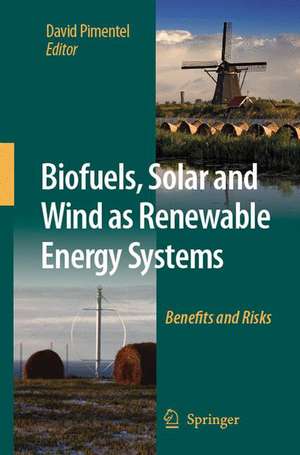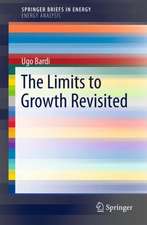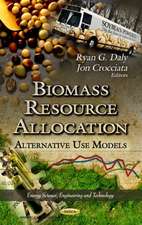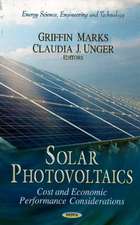Biofuels, Solar and Wind as Renewable Energy Systems: Benefits and Risks
Editat de D. Pimentelen Limba Engleză Hardback – 4 aug 2008
| Toate formatele și edițiile | Preț | Express |
|---|---|---|
| Paperback (1) | 579.15 lei 38-45 zile | |
| SPRINGER NETHERLANDS – 19 oct 2010 | 579.15 lei 38-45 zile | |
| Hardback (1) | 650.62 lei 6-8 săpt. | |
| SPRINGER NETHERLANDS – 4 aug 2008 | 650.62 lei 6-8 săpt. |
Preț: 650.62 lei
Preț vechi: 765.44 lei
-15% Nou
Puncte Express: 976
Preț estimativ în valută:
124.59€ • 128.37$ • 104.55£
124.59€ • 128.37$ • 104.55£
Carte tipărită la comandă
Livrare economică 21 februarie-07 martie
Preluare comenzi: 021 569.72.76
Specificații
ISBN-13: 9781402086533
ISBN-10: 1402086539
Pagini: 528
Ilustrații: XXI, 504 p.
Dimensiuni: 156 x 235 x 38 mm
Greutate: 0.84 kg
Ediția:2008
Editura: SPRINGER NETHERLANDS
Colecția Springer
Locul publicării:Dordrecht, Netherlands
ISBN-10: 1402086539
Pagini: 528
Ilustrații: XXI, 504 p.
Dimensiuni: 156 x 235 x 38 mm
Greutate: 0.84 kg
Ediția:2008
Editura: SPRINGER NETHERLANDS
Colecția Springer
Locul publicării:Dordrecht, Netherlands
Public țintă
ResearchCuprins
Renewable and Solar Energy Technologies: Energy and Environmental Issues.- Can the Earth Deliver the Biomass-for-Fuel we Demand?.- A Review of the Economic Rewards and Risks of Ethanol Production.- Subsidies to Ethanol in the United States.- Peak Oil, EROI, Investments and the Economy in an Uncertain Future.- Wind Power: Benefits and Limitations.- Renewable Diesel.- Complex Systems Thinking and Renewable Energy Systems.- Sugarcane and Ethanol Production and Carbon Dioxide Balances.- Biomass Fuel Cycle Boundaries and Parameters: Current Practice and Proposed Methodology.- Our Food and Fuel Future.- A Framework for Energy Alternatives: Net Energy, Liebig’s Law and Multi-criteria Analysis.- Bio-Ethanol Production in Brazil.- Ethanol Production: Energy and Economic Issues Related to U.S. and Brazilian Sugarcane.- Ethanol Production Using Corn, Switchgrass and Wood; Biodiesel Production Using Soybean.- Developing Energy Crops for Thermal Applications: Optimizing Fuel Quality, Energy Security and GHG Mitigation.- Organic and Sustainable Agriculture and Energy Conservation.- Biofuel Production in Italy and Europe: Benefits and Costs, in the Light of the Present European Union Biofuel Policy.- The Power Density of Ethanol from Brazilian Sugarcane.- A Brief Discussion on Algae for Oil Production: Energy Issues.
Recenzii
From the reviews:
"The book dedicates most of its 20 chapters to biofuels … . The test is well referenced … . The collection amasses evidence for one side of the increasingly polarized debate about biofuels. It is an important addition to libraries that include works on biofuels … . Summing Up: Recommended. Professional and academic audiences, upper-division undergraduates and up." (M. K. Bomford, Choice, Vol. 46 (7), March, 2009)
"The book dedicates most of its 20 chapters to biofuels … . The test is well referenced … . The collection amasses evidence for one side of the increasingly polarized debate about biofuels. It is an important addition to libraries that include works on biofuels … . Summing Up: Recommended. Professional and academic audiences, upper-division undergraduates and up." (M. K. Bomford, Choice, Vol. 46 (7), March, 2009)
Notă biografică
David Pimentel is a professor of ecology and agricultural sciences at Cornell University, Ithaca, NY 14853-0901. His Ph.D. is from Cornell University. His research spans the fields of energy, ecological and economic aspects of pest control, biological control, biotechnology, sustainable agriculture, land and water conservation, and environmental policy. Pimentel has published more than 600 scientific papers and 25 books and has served on many national and government committees including the National Academy of Sciences; President’s Science Advisory Council; U.S Department of Agriculture; U.S. Department of Energy; U.S. Department of Health, Education and Welfare; Office of Technology Assessment of the U.S. Congress; and the U.S. State Department.
Textul de pe ultima copertă
With shortages of fossil energy, especially oil and natural gas, and heavy biomass energy use occurring in both developed and developing countries, a major focus has developed worldwide on renewable energy systems. Renewable energy systems include wind power, biomass, photovoltaics, hydropower, solar thermal, thermal ponds, and biogas.
Currently, a heavy focus is on biofuels made from crops, such as corn, sugarcane, and soybeans, for use as renewable energy sources. Wood and crop residues also are being used as fuel. Though it may seem beneficial to use renewable plant materials for biofuel, the use of crop residues and other biomass for biofuels raises many concerns about major environmental problems, including food shortages and serious destruction of vital soil resources.
All renewable energy systems need to be investigated because humankind has only about 40 years of oil and gas reserves remaining. There is a 50 to 100 year supply of coal resources in the ground, but coal will become increasingly difficult to extract and will greatly increase the global warming threat.
Serious energy conservation and research on viable renewable energy technologies are needed. This book considers the effectiveness and economics of several renewable energy technologies of current interest, including biofuels, solar and wind.
Currently, a heavy focus is on biofuels made from crops, such as corn, sugarcane, and soybeans, for use as renewable energy sources. Wood and crop residues also are being used as fuel. Though it may seem beneficial to use renewable plant materials for biofuel, the use of crop residues and other biomass for biofuels raises many concerns about major environmental problems, including food shortages and serious destruction of vital soil resources.
All renewable energy systems need to be investigated because humankind has only about 40 years of oil and gas reserves remaining. There is a 50 to 100 year supply of coal resources in the ground, but coal will become increasingly difficult to extract and will greatly increase the global warming threat.
Serious energy conservation and research on viable renewable energy technologies are needed. This book considers the effectiveness and economics of several renewable energy technologies of current interest, including biofuels, solar and wind.
Caracteristici
Stimulates the discussion on the use of biomass for biofuels Contributes to the growing interest in alternative energy sources 20 chapters by worldwide experts in the field illuminate the global discussion













